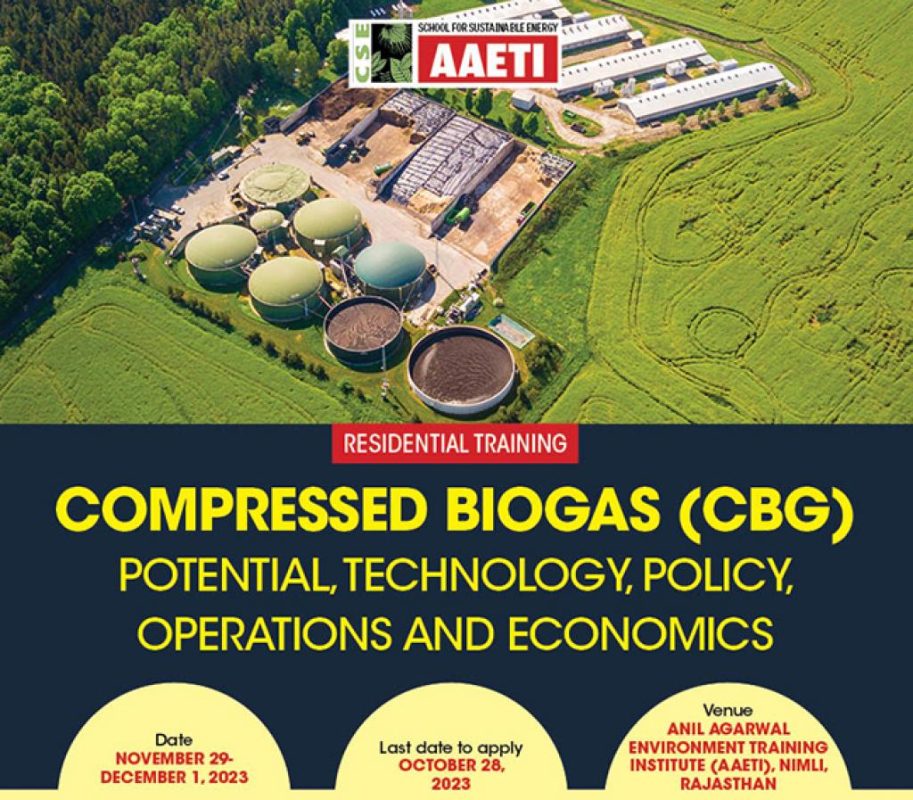Residential Training: Compressed Biogas Potential, Technology, Policy, Operations and Economics : CSE

![]()
Apply by 28th Oct 23 | Date: Nov 29th to Dec 1 23 | Venue: Rajasthan
The Centre for Science and Environment (CSE) is a public interest research and advocacy organisation based in New Delhi. CSE researches into, lobbies for and communicates the urgency of development that is both sustainable and equitable. The scenario today demands using knowledge to bring about change. In other words, working India’s democracy. This is what we aim to do.The challenge, we see, is two-pronged. On the one hand, millions live within a biomass based subsistence economy, at the margins of survival. The environment is their only natural asset. But a degraded environment means stress on land, water and forest resources for survival. It means increasing destitution and poverty. Here, opportunity to bring about change is enormous.But it will need a commitment to reform – structural reform- in the way we do business with local communities. On the other hand, rapid industrialization is throwing up new problems: growing toxification and a costly disease burden. The answers will be in reinventing the growth model of the Western world for ourselves, so that we can leapfrog technology choices and find new ways of building wealth that will not cost us the earth. Our aim is to raise these concerns, participate in seeking answers and in pushing for answers, transforming these into policy and so practice. We do this through our research and by communicating our understanding through our publications. We call this knowledge-based activism. We hope we will make a difference.
The programme is open to Government officials, regulators, renewable energy nodal agencies, urban development authorities, civil society organizations, start-ups, professors, researchers, private sector consultants, individual practitioners, and international participants.professionals
Course Fee
» Government Officials: Registration fee is waived for Central and State Government officials*
» Indian Participants: R21,000
» Foreign Participants: US $300
*Cost of travel to Delhi and back for the nominated officials to be borne by the nominating government authority
The course fee is inclusive of travel from Delhi to the training institute, accommodation, food, resource person, and training kit.
The Indian government has set a target to raise the share of gas in the energy mix: 15 per cent by 2030 from the current 6.5 per cent. This move aims to transform India into a gas-oriented economy. Presently, India produces 34,000 million standard cubic meter of gas (MMSCM) but consumes 64,000 MMSCM, resulting in a substantial shortfall of 30,000 MMSCM. This deficit accounts for 47 per cent of the total consumption, which is fulfilled through imports. Compressed Biogas (CBG) as a domestic energy source can play a key role in addressing this gap and helping the nation achieve its clean energy goals.
The CBG production potential in India is estimated at around 62 million metric tonne, as per the Union Ministry of New and Renewable Energy (MNRE).The Sustainable Alternative Towards Affordable Transportation (SATAT) scheme aims to tap 15 million metric tonne of this. In the 2023-24 Union Budget, finance minister Nirmala Sitharaman has earmarked Rs 10,000 crore for the establishment of 200 CBG plants and 300 community and cluster-based plants. In addition to this budgetary allocation, the government has introduced several policies and initiatives to accelerate the implementation of CBG projects in India. These measures include MNRE’s Waste to Energy programme, the Swachh Bharat Mission (SBM), and the Galvanizing Organic Bio-Agro Resources (GOBAR)-DHAN scheme. However, despite these policy efforts, the number of CBG plants currently installed on the ground is only 46. This slow progress can be attributed to the limited dissemination of CBG-related information among potential investors.
Centre for Science and Environment (CSE)is offering a tailor-made three-day residential training programme on ‘CBG: Potential, Technology, Policy, Operation and Economics’. The high-impact training has been conceived to provide an end-to-end solution to design and install a CBG plant that aligns with the principles of circular economy, energy transition, and sustainable development.
The programme is open to government officials, regulators, renewable energy nodal agencies, urban development authorities, civil society organizations, start-ups, professors, researchers, private sector consultants,individual practitioners, and international participants.
For further details, Please contact the course coordinator
DR. RAHUL JAIN
Deputy Programme Manager
School for Sustainable Energy, CSE
Mobile: +91 8901448131
Email: rahul.jain@cseindia.org

